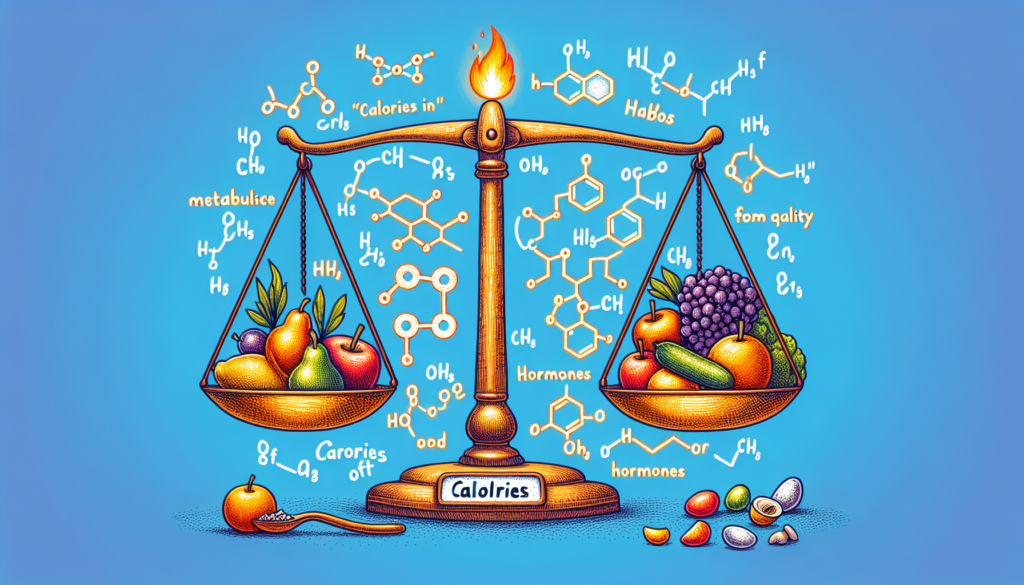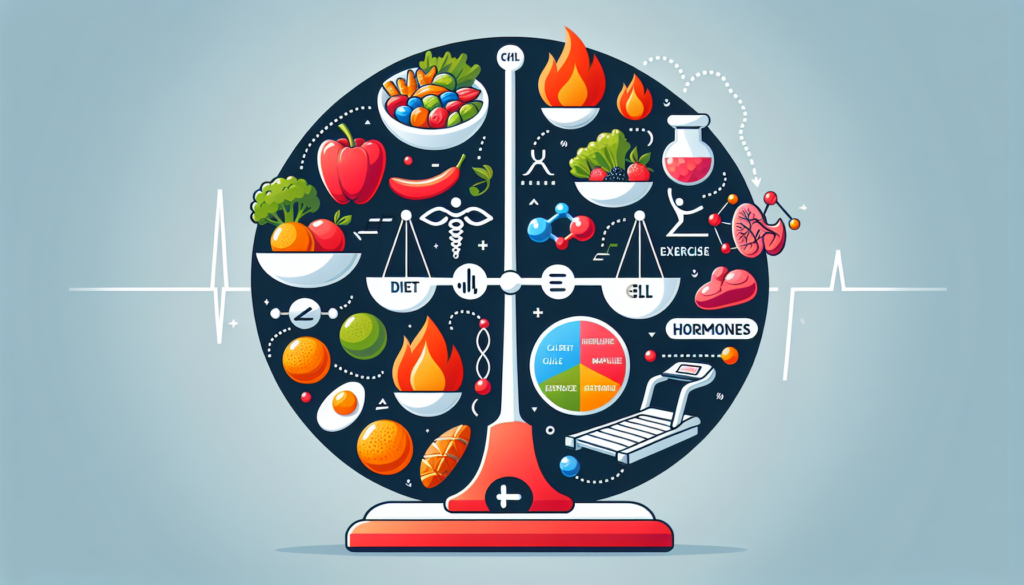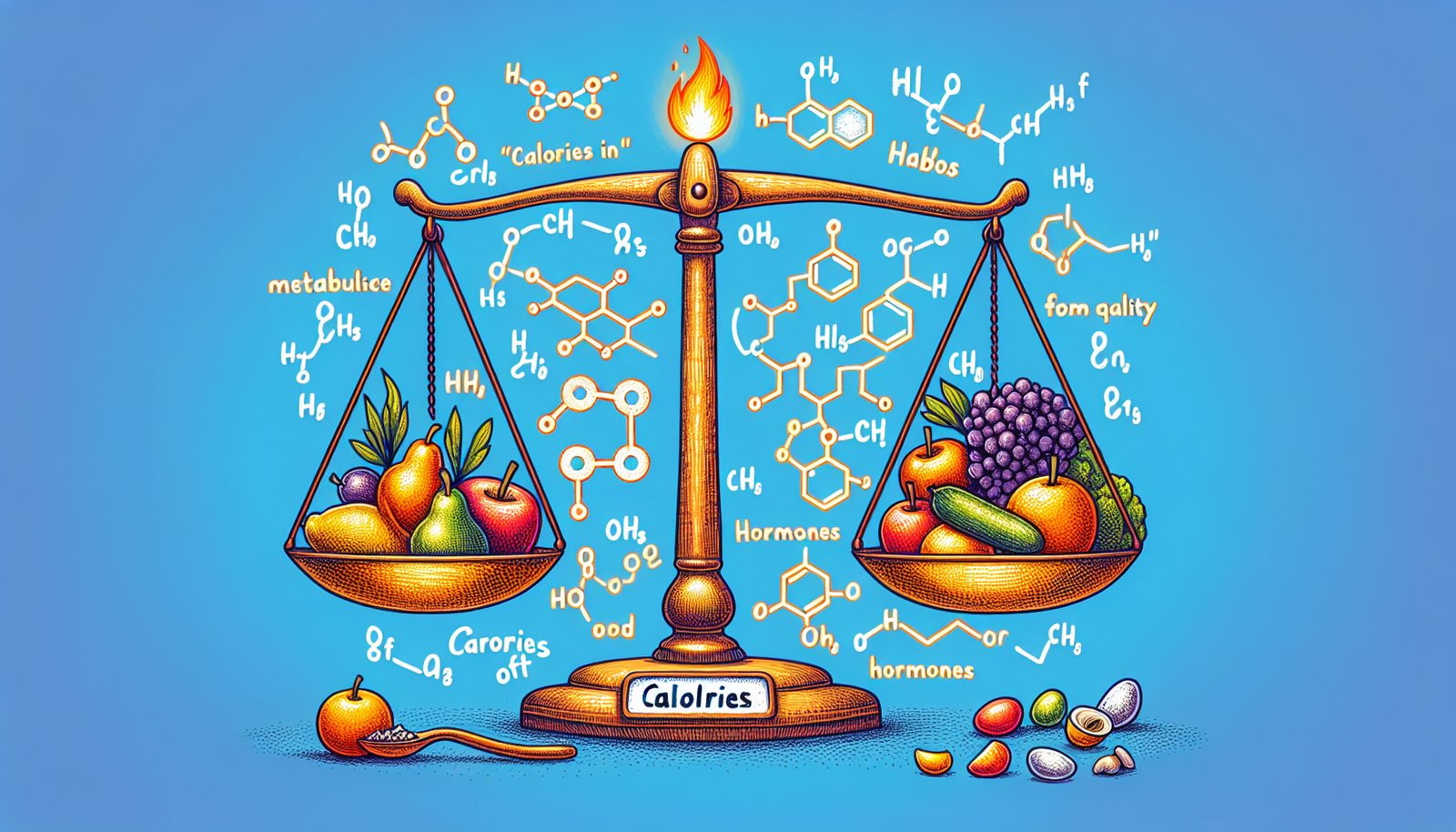If you’ve ever tried to shed a few pounds, you’ve probably heard the advice that losing weight is as simple as consuming fewer calories than you burn. But what if I told you that this widely accepted theory might not be entirely accurate? In this article, we’ll take a closer look at the myth of “calories in, calories out” and explore the alternative factors that play a significant role in our weight loss journey. So, get ready to challenge everything you thought you knew about losing weight, because it’s time to uncover the truth behind the numbers on the scale.

The Calories In, Calories Out Myth
Explanation of the myth
The “calories in, calories out” myth is a commonly held belief that weight loss is as simple as consuming fewer calories than you expend. According to this theory, if you eat fewer calories than your body needs, you will lose weight. If you consume more calories than you burn, you will gain weight. While it may seem logical at first glance, this oversimplified view fails to account for the complexities of weight loss.
Weight loss is more complex than just calorie balance
The truth is that weight loss is a multifaceted process influenced by various factors beyond calorie balance. While creating an energy deficit through calorie restriction is important, it is not the sole determinant of weight loss. Other aspects, such as metabolism, quality of calories, hormonal balance, exercise, sleep, and psychological factors, also play crucial roles in achieving sustainable weight loss.
The influence of metabolism on weight loss
Metabolism refers to the chemical processes that occur within the body to maintain life. It is responsible for converting food into energy and utilizing that energy for various bodily functions. Understanding your metabolism is essential for effective weight loss.
Understanding metabolism
Metabolism can be divided into two main components: basal metabolic rate (BMR) and the thermic effect of food (TEF). BMR is the energy your body needs to carry out basic functions at rest, such as breathing and organ function. TEF is the energy required for digestion, absorption, and utilization of nutrients from food.
Basal metabolic rate (BMR)
Your BMR accounts for the majority of your daily energy expenditure, amounting to around 60-75% of total calories burned. It is influenced by various factors, including age, gender, body composition, and genetics. Muscle mass, for example, tends to increase BMR, while age and a sedentary lifestyle can lower it.
The impact of genetics on metabolism
Genetics also play a significant role in your metabolic rate. Some individuals inherently have a faster or slower metabolism due to their genetic makeup. While genetics can influence metabolic rate, they do not determine your ability to lose weight. Lifestyle factors and environmental influences still play a substantial role in weight management.
Metabolic adaptation
One important consideration in weight loss is metabolic adaptation. As you lose weight, your body may adjust its metabolic rate to conserve energy. This adaptive response can reduce the number of calories burned at rest, making further weight loss more challenging. It is essential to have a holistic weight loss approach that takes into account metabolic adaptations and adjusts strategies accordingly.
Quality of Calories Matters
Not all calories are created equal
It is crucial to recognize that not all calories are equal in terms of their impact on weight loss. Different foods can have varying effects on hunger, metabolism, and overall health. For example, consuming 100 calories from vegetables will provide more nutritional value and satiety than 100 calories from sugary beverages.
The role of macronutrients
Macronutrients, including carbohydrates, proteins, and fats, are the building blocks of our diet. Each macronutrient has a different effect on our bodies. Protein, for instance, promotes satiety and helps preserve lean muscle mass during weight loss. Carbohydrates and fats provide energy but can vary in their effects on hunger and overall health depending on their quality.
Effects of processed foods on weight loss
Processed foods, which are often high in added sugars, unhealthy fats, and refined grains, can hinder weight loss efforts. They tend to be calorie-dense and nutrient-poor, causing blood sugar spikes, inflammation, and increased hunger. By focusing on whole, unprocessed foods, you can enhance weight loss by providing your body with essential nutrients and reducing overall calorie intake.
The importance of nutrient density
Nutrient density refers to the amount of beneficial nutrients in a given food relative to its calorie content. Choosing foods that are rich in vitamins, minerals, and antioxidants can support weight loss by nourishing your body and promoting overall health. Filling your plate with nutrient-dense fruits, vegetables, lean proteins, and whole grains can help you achieve your weight loss goals effectively.
Effect of Hormones on Weight Loss
Insulin’s role and impact on weight
Insulin, a hormone produced by the pancreas, plays a crucial role in regulating blood sugar levels. It also influences fat storage and energy expenditure. When insulin levels are consistently elevated due to diets high in refined carbohydrates and sugars, weight loss can become more challenging. Balancing insulin levels through a well-rounded diet can promote weight loss and overall metabolic health.
Leptin and ghrelin: The hunger hormones
Leptin and ghrelin are hormones that regulate hunger and satiety. Leptin signals to the brain that you are full and should stop eating, while ghrelin stimulates appetite. Imbalances in these hormones can lead to increased hunger and overeating. Aiming for a balanced diet that includes adequate protein, fiber, and healthy fats can help regulate these hormones and support weight loss.
Effects of stress hormones on weight gain
Stress hormones, such as cortisol, can impact weight loss efforts. When you are under chronic stress, cortisol levels remain elevated, which can lead to increased appetite, particularly for high-calorie, comfort foods. Managing stress through relaxation techniques, exercise, and self-care can minimize the impact of cortisol on weight management.
Hormonal imbalances and weight loss struggles
Hormonal imbalances, such as polycystic ovary syndrome (PCOS), hypothyroidism, or menopause, can make weight loss more challenging. These conditions can disrupt hormones involved in metabolism and appetite regulation. Consulting with a healthcare professional and implementing targeted strategies can help address hormonal imbalances and improve weight loss outcomes.
The Mistake of Focusing Solely on Exercise
Limitations of exercise for weight loss
While exercise is essential for overall health and can contribute to weight loss, it has limitations as a sole weight loss strategy. Studies have shown that exercise alone is often not sufficient for substantial weight loss. It is crucial to combine exercise with other lifestyle changes, such as dietary modifications and stress management, for optimal weight loss results.
Compensatory eating and exercise
Engaging in regular exercise can increase hunger and appetite, leading to compensatory eating behaviors. It is not uncommon for individuals to overestimate the number of calories burned during exercise and reward themselves with additional food, undermining their weight loss efforts. Being mindful of portion sizes and making wholesome food choices can help avoid overeating after exercise.
Muscle building and metabolism
Incorporating strength training or resistance exercises into your routine can help build muscle mass. Muscle is metabolically active and burns more calories at rest than fat. By increasing your muscle mass, you can raise your basal metabolic rate and enhance weight loss efforts. Additionally, exercise can improve body composition, leading to a healthier and more toned physique.
Finding a balanced approach
Rather than focusing solely on exercise for weight loss, it is important to adopt a balanced approach that combines various strategies. Incorporate both cardiovascular exercise and strength training into your routine, while also prioritizing nutrition, stress management, and sleep. This holistic approach will enhance your chances of achieving sustainable weight loss.


